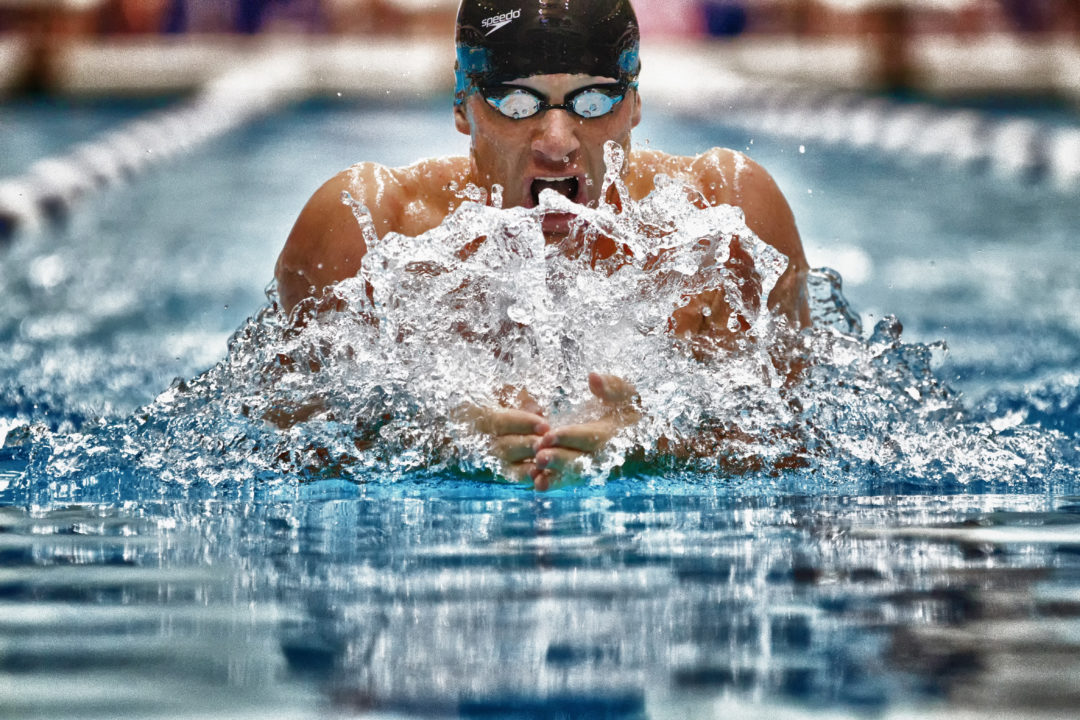During the mid-2000s, the fastest breaststroker in the world was American Brendan Hansen, who held both the 100-meter and 200-meter breast world records for 4 years. Hansen was also the only American man to swim under one minute in the 100-meter breast and 2:10 in the 200-meter breast from 2004-2008.
After picking up a silver (100 BR) and bronze medals (200 BR) from the 2004 Olympics, Hansen became hungry for individual Olympic gold during the 2005-2008 Olympic quad. At the 2006 U.S. Nationals, Hansen secured his spot for the 2006 Pan Pacs and 2007 Worlds teams for the 100 and 200 breast, taking down both of his own world records (59.30/2:09.04) from the 2004 U.S. Olympic Trials.
In 2005, FINA allowed a single downward dolphin kick into the breaststroke pullout. This new rule gave breaststrokers extra propulsion off their turns, and changed the stroke’s future dramatically.
100 Breast
Off the start, Hansen was ruthless, taking the race out in 27.66. Throughout the race, Hansen maintained a tempo of 1.15-1.30s, which was roughly the same as event runner-up Scott Usher (1:01.07). However, Hansen’s stroke was very biomechanically efficient that he was able to take 6 strokes less than Usher.
Stroke Count
- Hansen: 18/21
- Usher: 20/25
Hansen brought the race home in a 31.47, which was good enough to break his world record with a 59.13, which stood for 2 years until Kitajima broke it at the 2008 Olympics (58.91).
200 Breast
Hansen flexed his strong distance per stroke during the 200 breast final, immediately establishing a body-length lead on the field at the first turn. When looking at Hansen’s stroke in comparison to the others in the field, he finished each stroke cycle in a complete streamline, allowing him to build a high distance per stroke. However, what made his stroke lethal was how efficient every stroke was. Hansen swam 17 strokes after the first 50 off the start, yet his consistent technique propelled him to swim 17/18/20 strokes for the remaining three 50s.
At the finish, Hansen touched in at 2:08.74, knocking out his second world record of the meet. His world record also marked the first 200 breast swim under 2:09. At the 2006 Pan Pacs in August, Hansen broke his month-old world record at 2:08.50, which stood for two years until Kitajima took it down in June 2008 (2:07.51).
100 BR World Record Splits |
200 BR World Record Splits |
||||||
| 2004 US Trials | 2006 US Nationals | 2004 US Trials | 2006 US Nationals | ||||
| 1st 50 | 27.93 | 1st 50 | 27.66 | 1st 50 | 29.22 | 1st 50 | 28.87 |
| 2nd 50 | 31.37 | 2nd 50 | 31.47 | 2nd 50 | 32.66 | 2nd 50 | 32.71 |
| Final Time | 59.30 | Final Time | 59.13 | 3rd 50 | 33.50 | 3rd 50 | 33.26 |
| 4th 50 | 33.66 | 4th 50 | 33.90 | ||||
| Final Time | 2:09.04 | Final Time | 2:08.74 | ||||

What were his times in yards?
It simultaneously blows my mind and frustrates me that (1) American breaststroke hasn’t really gotten faster in 15 years and (2) I couldn’t find this caliber of video when I was swimming.
Outside of Peaty there really hasn’t been a massive upswing in men’s breaststroke production worldwide in the 100 breast. There are more guys capable of going 58s, but no 57s, whereas the 100 back and 100 fly have been taken below 52 and 50, respectively, from where they were around this time at 53 and 51. This being a 59.1, and with no swimmer besides Peaty having been over a second faster than that, is kind of crazy on the whole.
The 200 is a bit of a different story, as it seems like there are dozens of Americans who can break 2:10 at this point and the Trials top 8 could easily be under 2:09.
Not really a fair comparison, you’re jumping around a bit comparing one swimmer vs the rest of the pack. By 2006, Crocker had gone 50.40 on the 100 fly. Only Dressel and Schooling (by 1/100) have been faster in textile.
I’ll give you that backstroke has improved by streets though.
You have to also factor in that breaststroke has had the least amount of stroke development compared to the rest. Specify fly and back.. The two strokes referenced in the above progression analysis.
Backstroke has been changed by the strong upswing in the use of underwaters. Just look at scm/scy now… Half the race is underwater.
Fly benefits from the underwater surge, but to a lesser extent because underwaters were always a part of that stroke. The bigger development in fly was how training has grown. No longer is it you need to keep your head down and breath as little as possible, like freestyle. Breathing every stroke and having two equal strenghted kicks became overly developed and proved… Read more »
Absolutely correct – FINA must change this stroke whereby one can swim uh20 dolphin kick every 15 meters with flip turns and allow competitors to eat massive quantity of kidney beans and hot tamales before racing.
I watched the 200 swim live, and I’ll always remember it! It was the first world record I witnessed in person, and I got a picture with Brendan afterwards. For a 17 year old, it made my life. Brendan was a fantastic swimmer and is a great guy.
Is he still alive?
Yes
6 strokes fewer than Usher 😉
These obscure videos are a swimming geek’s (me) heaven
I love watching these back, feels like the good ole days. But the quality is cringe
definitely an android